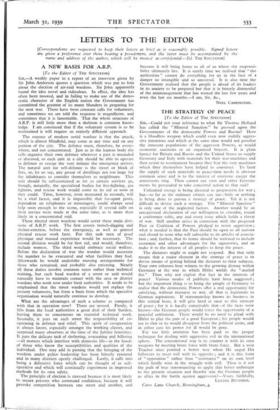LETTERS TO THE EDITOR
[Correspondents are requested to keep their letters as brief as is reasonably possible. Signed letters are given a preference over those bearing a pseudonym, and the latter must be accompanied by the name and address of the author, which will be treated as confidential.—Ed. THE SrEcrAToR]
A NEW BASIS FOR A.R.P.
[To the Editor of THE SPECTATOR] SIR,--A weekly paper in a report of an interview given by Sir John Anderson quotes a question which was put to him about the election of air-raid wardens. Sir John apparently found the idea novel and ridiculous. In effect, the idea has often been mooted, and in failing to make use of the demo- cratic character of the English nation the Government has committed the greatest of its many blunders in preparing for the next war. There have been constant calls for volunteers, and sometimes we are told the response is magnificent, and sometimes that it is lamentable. That the whole structure of A.R.P. is still little more than a skeleton is common know- ledge. I am convinced that if the voluntary system is to be maintained it will require an entirely different approach.
The essence of modern aerial warfare is that the attack, which is almost blindfold, may come at any time and on any portion of the city. The defence must, therefore, be every- where, and not concentrated. Just as in the human body the cells organise their own defence wherever a part is wounded or diseased, so each unit in a city should be able to operate in defence or rescue the very minute the emergency arrives. The natural unit for self-defence is the street or block of flats, or, let us say, any group of dwellings not too large for the inhabitants to consider themselves as neighbours. This unit should be self-contained as far as certain services go, though, naturally, the specialised bodies for fire-fighting, gas fighters, and rescue work would come to its aid as soon as they could. Time, however, even measured in seconds, will be a vital factor, and it is impossible that far-apart posts, dependent on telephones or messengers, could always send help soon enough to the scene, especially if several calls on their service were made at the same time, as is more than likely in a concentrated raid.
These elected street wardens would cover three main divi- sions of A.R.P. work. The first covers trench-digging and shelter-erection, before the emergency, as well as general physical rescue work later. For this task men of good physique and manual experience would be necessary. The second division would be for first aid, and would, therefore, include women. The third would embrace social welfare. Before the declaration of war the warden would ascertain the number to be evacuated and what facilities they had. Afterwards he would undertake massing arrangements for those who remained, and probably also rationing. Nearly all these duties involve common sense rather than technical training, but each head warden of a street or unit would naturally have to maintain contact with the area or district wardens who work now under local authorities. It needs to be emphasised that the street wardens would not replace the present volunteers, but form a basis from which the specialist organisation would naturally continue to develop.
What are the advantages of such a scheme as compared with that in operation now? There are several. Firstly, it lifts from the local authorities a great deal of their burden, leaving them to concentrate on essential technical work. Secondly, it puts on each street the responsibility of co- operating in defence and relief. This spirit of co-operation is always latent, especially amongst the working classes, and surprised many observers at the time of the Jubilee festivities. It puts the delicate task of sheltering, evacuating and billeting —all matters which interfere with domestic life—in the hands of those who know the susceptibilities and qualities of the individual. One may add in passing that the bringing of the wardens under police leadership has been bitterly resented and in many districts openly challenged. Lastly, it calls into being a defensive force which can be thought of as self- operative and which will continually experiment in improved methods for its own safety.
The principle of election is stressed because it is most likely to secure persons who command confidence, because it will provoke competition between one street and another, and because it will bring home to all of us where the responsi- bility ultimately lies. It is surely time we realised that " the authorities " cannot do everything for us in the face of a danger so intangible and so universal. It is also time the Government realised that the people is ahead of its leaders in its anxiety to be prepared but that it is bitterly distrustful of the mismanagement that has wasted the last few years and even the last six months.—I am, Sir, &c.,
NOEL CARRINGTON.


































































 Previous page
Previous page